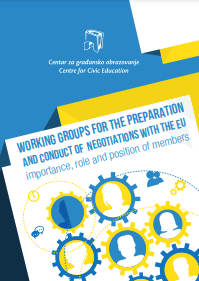Working groups for the preparation and conduct of negotiations with the EU -Importance, role and position of members
Working groups for the preparation and conduct of negotiations with the EU -Importance, role and position of members
Author(s): Ana Vujošević
Contributor(s): Daliborka Uljarević (Editor)
Subject(s): Politics, Governance, EU-Approach / EU-Accession / EU-Development
Published by: Centar za građansko obrazovanje (CGO)
Keywords: Montenegro; EU; negotiations; working groups; EU accession;
Summary/Abstract: The analysis “Working groups for the preparation and conduct of negotiations with the EU – importance, role and position of members” aims to contribute to the assessment of quality of this process and further improve the efficiency and effectiveness of work of negotiating structure by focusing on working groups, which are an integral part of negotiating structure. Thus the analysis is being done prior to fourth anniversary since Montenegro opened the negotiations with the European Union. Full membership of Montenegro in the EU presents one of its most important strategic objectives, which enjoys a high level of political concordance, as well as the support of Montenegrin citizens. Montenegro opened this process by signing the Stabilisation and Association Agreement (SAA) in 2007, and gained the status of candidate based on the decision of European Council in 2012. Accession negotiations officially began on 29 June 2012. By December 2015, Montenegro opened 22 chapters, out of which two are closed provisionally. In order to prepare for the opening of negotiations, Government of Montenegro in December 2011 appointed the Chief negotiator to conduct the negotiations with the EU, and in February 2012 it passed the Decision on the establishment of negotiation structure for the accession of Montenegro into European Union1 , which envisaged an important role for working groups during the preparation and conduct of negotiations with the EU Importance, role and position of members of working groups remain insufficiently emphasised in Montenegrin public, even though working groups represent one of the pillars of negotiation process. This motivated the Centre for Civic Education (CCE) to draw the attention on their work, as well as to try to assess how much was invested into their operation and what can be done to further utilise their role, especially considering the broad spectrum of stakeholders which they encompass. In that respect, the CCE had been collecting the information from February till May 2016, based on the Free Access to Information Law, on the members of working groups and the amount of funds which public sector bodies2 , that have the representatives in working groups within all negotiation chapter, paid for fees for these engagements. Furthermore, the CCE analysed the level of uniformity of fees between the members of working groups, as well as between the working groups. The information gathered were analysed in relation to the level of involvement of specific working groups, measured through the number of meetings that were held, and finally, the performance and results that were achieved so far. Information were gathered from the day the working groups for each negotiation chapter were formed to March 2016, and these are related to 16 ministries, 14 agencies, 5 funds, 7 agencies, 15 administrations and 58 other institutions (directorates, institutes, centres, courts, and etc.), which have the representatives in working groups. According to the information that the CCE gathered, total amount of funds which public sector bodies invested into their designated representatives in working groups amounted 441.235.16 EUR, for the period from March 2012 to March 2016. Data indicate on the absence of clearly and precisely defined criteria based on which the allocations for members of working groups, heads of working groups and coordinators of subgroups are being made. Therefore, the CCE prepared the recommendations in order to better regulate this system, which would thus put the members in an equal position, and assess them based on their performance.
Series: CGO - EU integracije
- E-ISBN-13: 978-86-85591-71-6
- Print-ISBN-13: 978-86-85591-71-6
- Page Count: 27
- Publication Year: 2016
- Language: English
- Sample-PDF
- Introduction
- Table of Content
- eBook-PDF

